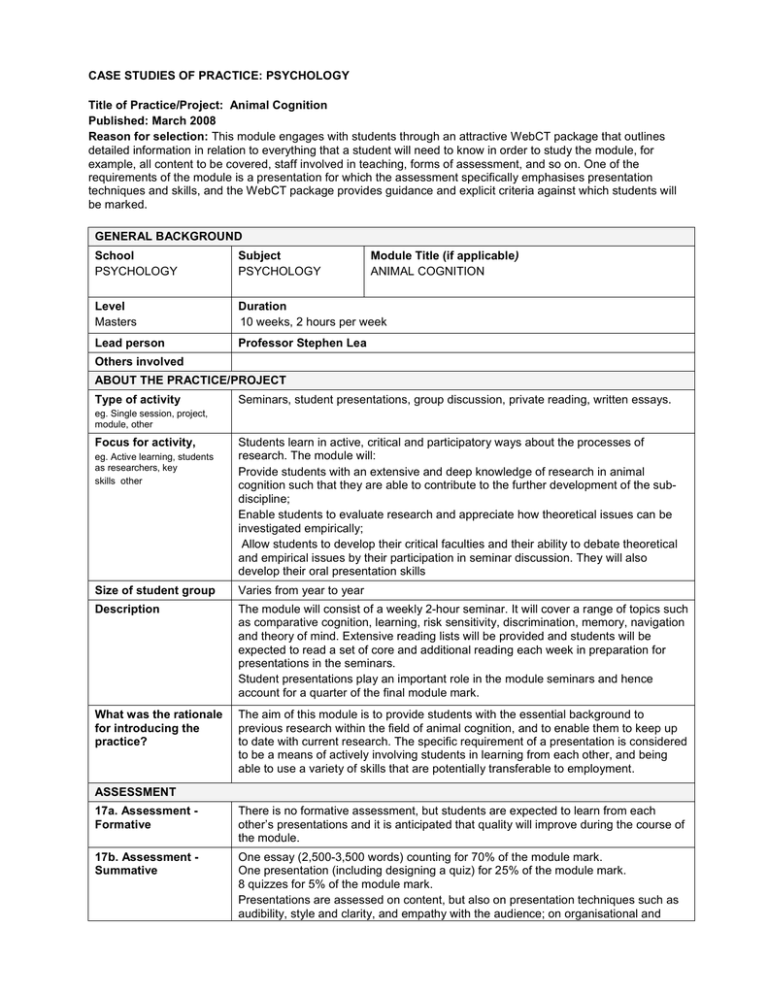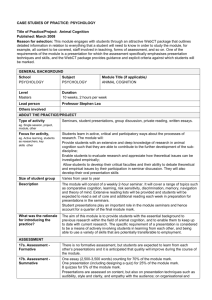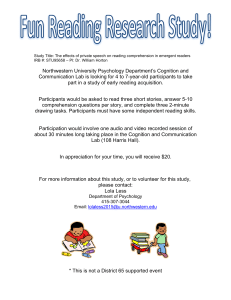CASE STUDIES OF PRACTICE: PSYCHOLOGY Title of Practice/Project: Animal Cognition
advertisement

CASE STUDIES OF PRACTICE: PSYCHOLOGY Title of Practice/Project: Animal Cognition Published: March 2008 Reason for selection: This module engages with students through an attractive WebCT package that outlines detailed information in relation to everything that a student will need to know in order to study the module, for example, all content to be covered, staff involved in teaching, forms of assessment, and so on. One of the requirements of the module is a presentation for which the assessment specifically emphasises presentation techniques and skills, and the WebCT package provides guidance and explicit criteria against which students will be marked. GENERAL BACKGROUND School PSYCHOLOGY Subject PSYCHOLOGY Module Title (if applicable) ANIMAL COGNITION Level Masters Duration 10 weeks, 2 hours per week Lead person Professor Stephen Lea Others involved ABOUT THE PRACTICE/PROJECT Type of activity Seminars, student presentations, group discussion, private reading, written essays. eg. Single session, project, module, other Focus for activity, eg. Active learning, students as researchers, key skills other Students learn in active, critical and participatory ways about the processes of research. The module will: Provide students with an extensive and deep knowledge of research in animal cognition such that they are able to contribute to the further development of the subdiscipline; Enable students to evaluate research and appreciate how theoretical issues can be investigated empirically; Allow students to develop their critical faculties and their ability to debate theoretical and empirical issues by their participation in seminar discussion. They will also develop their oral presentation skills Size of student group Varies from year to year Description The module will consist of a weekly 2-hour seminar. It will cover a range of topics such as comparative cognition, learning, risk sensitivity, discrimination, memory, navigation and theory of mind. Extensive reading lists will be provided and students will be expected to read a set of core and additional reading each week in preparation for presentations in the seminars. Student presentations play an important role in the module seminars and hence account for a quarter of the final module mark. What was the rationale for introducing the practice? The aim of this module is to provide students with the essential background to previous research within the field of animal cognition, and to enable them to keep up to date with current research. The specific requirement of a presentation is considered to be a means of actively involving students in learning from each other, and being able to use a variety of skills that are potentially transferable to employment. ASSESSMENT 17a. Assessment Formative There is no formative assessment, but students are expected to learn from each other’s presentations and it is anticipated that quality will improve during the course of the module. 17b. Assessment Summative One essay (2,500-3,500 words) counting for 70% of the module mark. One presentation (including designing a quiz) for 25% of the module mark. 8 quizzes for 5% of the module mark. Presentations are assessed on content, but also on presentation techniques such as audibility, style and clarity, and empathy with the audience; on organisational and management skills such as pacing, response to questions or interruptions, and teamwork; and on discussion skills, such as being able to raise points that stimulate the group to work and think, as well as having the ability to handle discussion well. 17c. Assessment criteria (web link if available) A screen shot is included here of the module’s WebCT pages showing the link and full criteria/mark breakdown for the module assessment, including advice for students.




